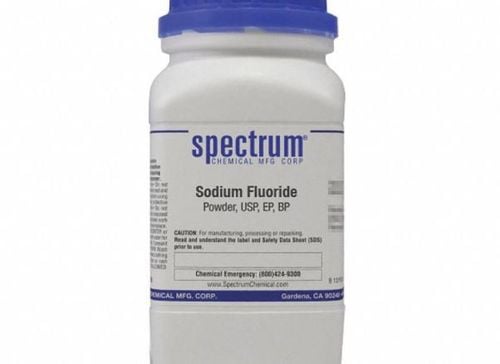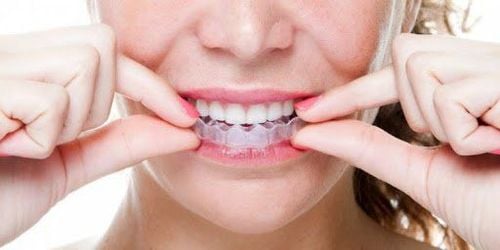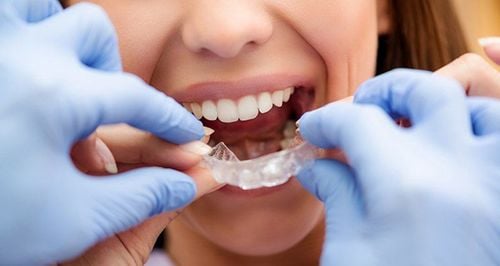This is an automatically translated article.
Sensitive toothache is often the result of worn enamel, exposed roots, cavities, or chipped teeth. Sensitive teeth will cause you pain when performing some activities such as brushing, eating. Therefore, you need timely treatment to prevent the condition from getting worse.
1. How to take care of sensitive teeth?
Enamel is a hard protective layer that helps teeth cope with everything you put in your mouth. When the enamel disappears, the nerve endings are exposed. If you have sensitive teeth, it's possible that part of your enamel has worn away.
To prevent or reduce damage caused by sensitive teeth you need to:
Don't brush too hard: Do you clean your teeth vigorously? You can take away more than just plaque. Brushing from side to side right at the gum line can wear down enamel faster. You should use a soft bristle brush and an angle of 45 degrees to the gums to keep the enamel clean and strong. Avoid acidic foods and drinks: Soda, marshmallows, high-sugar candies - all of these attack tooth enamel. Instead, snack on high-fiber fruits and vegetables, cheese, whole milk or yogurt. These foods will moisten your mouth and help fight acids and bacteria that can eat away at your teeth. Clenching your teeth: Over time, bruxism wears down your enamel. Sometimes, dealing with your stress can stop the problem. If that doesn't work, your dentist may put a brace or mouth guard on for you. If the problem is severe, you may need dental work to change the position of your teeth or a muscle relaxant.
Take a break from bleaching: Bleaching can be painful. Thankfully, bleaching sensitivities are usually only temporary. Talk to your dentist about how treatment might affect you and whether you should continue bleaching.
2. Find out what causes sensitive teeth
Sometimes tooth sensitivity can be a sign of other problems, like:
Naturally shrink gums: If you're over 40, it's possible your gums are showing signs of wear and tear due to tooth extraction and tooth loss. exposed tooth roots. These roots don't have the enamel to protect them, so they're much more sensitive than the rest of the teeth. Let your dentist know if your gums look like they are receding. It could be a sign of other problems like gum disease. Severe cases may require a gum graft. Gum disease: Plaque and tartar that accumulate on teeth can cause gums to recede. It can destroy the supporting bone of the tooth. Don't smoke, it can lead to gum disease. For treatment, the dentist may clean the teeth to remove tartar and plaque below the gum line. You may also need medication or surgery to correct gum disease. Cracked or damaged tooth filling: When you break a tooth, the crack can go all the way down to the root. You will feel a toothache when it's cold. How the dentist fixes the crack depends on how deep it is. If it's a small crack that ends before the gums begin, your dentist may be able to fill the tooth. If it is below your gum line, your tooth will have to be extracted and replaced with a denture.

Đau răng nhạy cảm thường là kết quả của men răng bị mòn, chân răng lộ ra ngoài
3. Sensitive teeth what to do?
To know what to do with sensitive teeth, you need to see a dentist for treatment. Once you've figured out what's causing your sensitive teeth, your dentist can use a variety of remedies to help relieve the pain, including:
Toothpaste for sensitive teeth; Fluoride gel; Fill the exposed roots; Sealant; A desensitization paste (not for use with a toothbrush) you can get from your dentist; A mouth guard to protect your teeth if you grind your teeth; If your case is severe, your dentist may recommend a root canal. It is important that you do not shy away from dental care because of a toothache. Ignoring this could make things worse. Brush and floss twice a day to keep your smile bright and pain free. Visit your dentist for checkups twice a year.
4. Remedies for sensitive teeth pain at home
4.1. Desensitizing Toothpaste Desensitizing toothpaste contains compounds that help protect nerve endings from irritants. The main ingredient of this cream is potassium nitrate, a compound that blocks pain signals from traveling from nerves in your teeth to your brain.
After a few uses, your sensitivity will decrease. Dentists also recommend using a soft-bristled toothbrush and fluoride mouthwash.
4.2. Gargle with Salt Water Salt is an effective antiseptic and can also help reduce inflammation. To ease symptoms of a sensitive toothache, rinse your mouth with salt water twice daily. How to make your own salt water gargle:
Add 1/2 to 3/4 teaspoon of salt to a cup of warm water and stir well; Gargle with salt water in your mouth for up to 30 seconds; Spit it out after rinsing. 4.3. Hydrogen peroxide is a mild antiseptic, commonly used to help disinfect skin wounds, burns, and other wounds to prevent infection. You can also use peroxide as a mouthwash to heal gums and prevent infection. To use hydrogen peroxide gargle you need to do the following:
Add two caps of 3% hydrogen peroxide in equal parts warm water; Gargle the solution in your mouth for up to 30 seconds; Finish spitting out; Then rinse your mouth with water to remove any remaining hydrogen peroxide. 4.4. Honey and warm water Honey is an antibacterial agent and can be used to treat wounds. It can help speed up wound healing, reducing pain, swelling, and inflammation.
To relieve the pain of sensitive teeth, you can gargle with warm water with a spoonful of honey. This mouthwash will help promote wound healing in the mouth.
4.5. Using Turmeric to Relieve Sensitive Toothache In addition to being a spice in cooking, turmeric can also be used as an anti-inflammatory treatment. Turmeric contains a compound called curcumin that has anti-inflammatory effects. It has been used therapeutically in the treatment of gastrointestinal pathologies and as an agent to enhance wound healing.
To relieve pain caused by sensitive teeth, you can rub ground turmeric on your teeth. An alternative is to make a paste of 1 teaspoon turmeric, 1/2 teaspoon salt, and 1/2 teaspoon mustard oil. Mix well, then apply this mixture to your teeth and gums twice a day for pain relief.

Để giảm bớt các triệu chứng đau răng nhạy cảm, bạn hãy súc miệng bằng nước muối
4.6. Green Tea Green tea is another medicinal herb known for its health benefits. Green tea has been used in cancer prevention and heart health studies for its antioxidant effects and anti-inflammatory properties. Green tea may also offer certain benefits for oral health.
For sensitive toothache, you can use unsweetened green tea as a mouthwash twice a day to strengthen teeth and reduce inflammation.
4.7. Capsaicin helps relieve pain Capsaicin is found in hot peppers and many other hot peppers. That's what makes these chili peppers so spicy. This active ingredient has analgesic properties and is used to treat burning mouth syndrome by reducing inflammation and pain.
For sensitive toothaches, you can use capsaicin as a topical gel or through a mouthwash. There may be a burning sensation at first, but will eventually provide relief from painful symptoms with continued use.
4.8. Antiseptic and Pain Relief Vanilla Extract Vanilla Extract has antiseptic and analgesic properties. It has been used to treat pain and discomfort for babies when they start teething.
To treat a sensitive toothache, apply vanilla extract to a cotton ball. Place the cotton pad on the gums for a few minutes and repeat the process as often as needed.
There are several home remedies that you can apply to treat sensitive toothache. However, intensive treatment solutions for dental pain are recommended. Because home remedies may provide temporary pain relief, they cannot cure the source of your discomfort. If your symptoms persist after a few days, you may need additional treatment. Talk to your dentist about effective treatments for your condition.
Please dial HOTLINE for more information or register for an appointment HERE. Download MyVinmec app to make appointments faster and to manage your bookings easily.
References: webmd.com, mayoclinic.org, healthline.com












